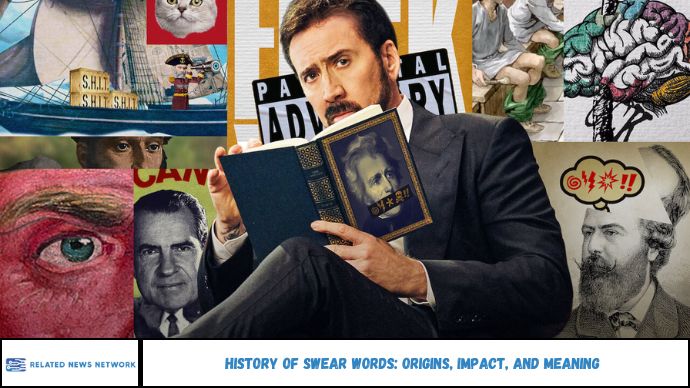The history of swear words is rich, complex, and far older than most people realize. From ancient invectives to modern slang, profanity has always reflected social norms, power dynamics, and emotional expression. This article explores where curse words come from, how their meanings evolved, and why they remain both taboo and powerful in modern language.
Everyone does it. Whether whispered under your breath in traffic or shouted after stubbing a toe, swearing is a universal part of human expression. But have you ever stopped to wonder where swear words actually come from?
Let’s be honest—sometimes, swearing just feels really good. And according to science, it might actually be good for you. Far from being just a sign of poor vocabulary, research suggests that the occasional well-placed curse word can have surprising benefits.
Studies show that swearing can increase pain tolerance, relieve stress, and even enhance emotional resilience. It’s also been linked to verbal fluency and honesty, challenging the idea that profanity signals a lack of intelligence. Beyond the mind, swearing may even provide a modest boost in physical performance, especially in high-intensity situations.
Swear words feel like a natural part of everyday language now—but where did they come from? Their roots stretch back through history, from ancient Rome to the Renaissance and into our digital age. The history of swearing reveals not only how language evolves, but also how taboos shift alongside cultural values. And understanding that history might just help us predict where those four-letter words are heading next.
1. Ancient Origins: Swearing Is Older Than You Think
Swear words go back thousands of years. The earliest forms of profanity weren’t just about being rude—they often involved breaking religious or social taboos.
Key origins include:
- Ancient Rome and Greece used sexual and scatological insults in both everyday speech and political satire.
- In Old English, many modern swear words like shit and fuck had literal, non-taboo meanings.
- Swearing was often tied to blasphemy—taking the Lord’s name in vain was among the first “true” curses.
A study published in Language Sciences in 2020 confirms that profanity is found in nearly every documented language family.
2. Religion and Morality: Cursing and the Church
As Christianity spread through Europe, so did rules around “clean” language.
Major shifts:
- Medieval Christianity heavily censored blasphemous language.
- Swearing became not just rude—but sinful, especially anything invoking God, the devil, or sacred objects.
- Laws in the 1600s in England and colonial America criminalized profanity, with penalties ranging from fines to whipping.
These religious roots explain why older curses were often spiritual in nature—like damn or hell—rather than sexual or bodily.
3. Class and Control: Swearing as Social Rebellion
Throughout history, swearing has often served as a form of resistance or a mark of lower social status.
Key insights:
- The educated elite avoided profanity, while the working class used it more freely.
- Swearing became linked with masculinity, labor, and the military.
- In Victorian England, strict rules around “proper” speech created a wider cultural gap between the upper and lower classes.
In other words, swear words often marked who had power—and who didn’t.
4. Why We Swear: Neuroscience Behind Profanity
Swearing isn’t just a bad habit—it’s neurologically distinct from other language.
Scientific findings:
- A 2009 study in NeuroReport found that swearing can increase pain tolerance.
- Swear words activate the amygdala, the brain’s emotional processing center.
- They also trigger a stronger autonomic response, like raised heart rate and adrenaline.
This helps explain why swearing feels so satisfying—and why it’s so hard to stop once it becomes habitual.
5. Swearing Today: Evolving Language, Shifting Taboos
In the modern world, swear words are everywhere—from TV scripts to viral tweets.
Cultural developments:
- Censorship is loosening, especially with streaming and digital media.
- Swearing is now studied as a linguistic and psychological tool, not just a vice.
- New words constantly emerge, while older curses may lose their sting.
For example, bloody is still offensive in parts of the UK but has lost its shock value elsewhere. Meanwhile, racial, gendered, or identity-based slurs are increasingly recognized as hate speech, not casual profanity.
FAQs
1. Where do swear words come from?
Most originate from ancient languages and were tied to religion, sex, and bodily functions.
2. Why do certain words offend us?
Because they challenge social norms, break taboos, or express strong emotion.
3. Is swearing bad for you?
Not necessarily—some studies suggest swearing relieves pain and stress.
4. What was the first swear word?
It’s debated, but words like shit and fuck have early Germanic and Anglo-Saxon roots.
5. Do all cultures have swear words?
Yes. Swearing appears in every known language, though the taboos vary widely.
6. Can swearing be good for communication?
Yes, when used sparingly, it can enhance expression and even build social bonds.
Conclusion
Swear words have journeyed from ancient rituals and religious defiance to modern tweets and therapy sessions. They’re more than just offensive sounds—they’re linguistic tools shaped by culture, emotion, and power.
By understanding the origins and evolution of profanity, we not only explore language, but also human nature itself. So the next time you let one fly, remember: it’s part history, part psychology, and totally human.









